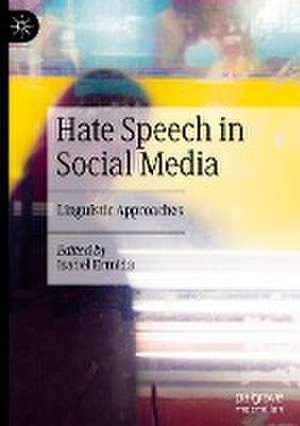Hate Speech in Social Media: Linguistic Approaches
Editat de Isabel Ermidaen Limba Engleză Hardback – 12 dec 2023
Preț: 954.45 lei
Preț vechi: 1163.97 lei
-18% Nou
Puncte Express: 1432
Preț estimativ în valută:
182.64€ • 188.42$ • 152.41£
182.64€ • 188.42$ • 152.41£
Carte tipărită la comandă
Livrare economică 26 martie-09 aprilie
Preluare comenzi: 021 569.72.76
Specificații
ISBN-13: 9783031382475
ISBN-10: 3031382471
Pagini: 443
Ilustrații: XX, 443 p. 54 illus., 31 illus. in color.
Dimensiuni: 148 x 210 mm
Greutate: 0.7 kg
Ediția:1st ed. 2023
Editura: Springer Nature Switzerland
Colecția Palgrave Macmillan
Locul publicării:Cham, Switzerland
ISBN-10: 3031382471
Pagini: 443
Ilustrații: XX, 443 p. 54 illus., 31 illus. in color.
Dimensiuni: 148 x 210 mm
Greutate: 0.7 kg
Ediția:1st ed. 2023
Editura: Springer Nature Switzerland
Colecția Palgrave Macmillan
Locul publicării:Cham, Switzerland
Cuprins
INTRODUCTION: ONLINE HATE SPEECH – OBJECT, APPROACHES, ISSUES
Chapter 1. Building and Analysing a Hate Speech Corpus: The NETLANG Experience and Beyond – Isabel Ermida
Chapter 2. Distinguishing Hate Speech from Aggressive Speech: A Five-Factor Annotation Model – Isabel Ermida
PART I. STRUCTURAL PATTERNS IN HATE SPEECH
Chapter 3. Improving NLP Techniques by Integrating Linguistic Input to Detect Hate Speech in CMC Corpora – Idalete Dias and Filipa Pereira
Chapter 4. First-person Aggression Verbs in YouTube Comments – Ylva Biri, Laura Hekanaho, and Minna Palander-Collin
Chapter 5. Emotional Deixis in Online Hate Speech – Joana Aguiar and Pilar Barbosa
Chapter 6. Derogatory Linguistic Mechanisms in Online Hate Speech – Eckhard Bick
PART II. LEXICAL AND RHETORICAL STRATEGIES IN THE EXPRESSION OF HATE SPEECH
Chapter 7. Humorous Use of Figurative Language in Religious Hate Speech – Liisi Laineste and Wladyslaw Chłopicki
Chapter 8. Rhetorical Questions as Conveyors of Hate Speech – Vahid Parvaresh and Gemma Harvey
Chapter 9. Enabling Concepts in Hate Speech: The Function of the Apartheid Analogy in Antisemitic Online Discourse about Israel – Matthew Bolton, Matthias J. Becker, Laura Ascone, and Karolina Placzynta
Chapter 10. Hate Speech in Poland in the Context of the War in Ukraine – Lucyna Harmon
PART III. THE INTERACTIONAL DIMENSION OF HATE SPEECH: NEGOTIATING, STANCE-TAKING, COUNTERING
Chapter 11. Stance-taking and Gender: Hateful Representations of Portuguese Women Public Figures in the NETLANG Corpus – Rita Faria Chapter 12. Negotiating Hate and Conflict in Online Comments: Evidence from the NETLANG Corpus – Jan Chovanec
Chapter 13. Linguistic Markers of Affect and the Gender Dimension in Online Hate Speech – Kristina Pahor de Maiti, Jasmin Franza, and Darja Fišer
Chapter 14. Counteracting Homophobic Discourse in Internet Comments: Fuelling or Mediating Conflict? – Jūratė Ruzaitė
Notă biografică
Isabel Ermida is Professor of Linguistics at the Department of English Studies, University of Minho, Portugal. She has dedicated her research to the pragmatic analysis of forms of indirectness and implicitness in language, with a key interest in humour, on which she has published extensively (The Language of Comic Narratives, 2008; Language and Humour in the Media, co-edited, 2012). Her latest work explores the language of hate speech, focusing on the expression of power and the ideological construction of identity and belonging. Drawing on impoliteness studies and speech act scholarship, she has analysed the prejudiced and discriminatory representation of social variables such as gender, nationality, ethnicity, age, and social class in public discourse. Her latest international financed project (NETLANG) delves into the language of hate speech on social media.
Textul de pe ultima copertă
This edited book offers insight into the linguistic construction of prejudice and discrimination in social media. Drawing on the outputs of a three-year research project, NETLANG, involving scholars from five European countries (Portugal, Czech Republic, Estonia, Finland and Poland), as well as on external contributions from participants in the project’s final conference, the collection brings together a variety of linguistic approaches to the study of online hate speech, ranging from Pragmatics to Syntax, Lexis, Stylistics, Natural Language Processing (NLP) and Corpus Linguistics. Data from English, Portuguese, Danish, Lithuanian, Persian, Polish, and Slovenian are examined, along with various geopolitical contexts for hate speech, especially anti-refugee and anti-immigrant discourse. The authors explore a continuum of overt to covert textual data, namely: (i) structural elements, such as syntactic and morphological patterns found to recur throughout the texts; (ii) lexical and stylistic elements, revealing the often implicit ways vocabulary choices and rhetorical devices signal the expression of hate; and (iii) interactional elements, concerning the pragmatic relationships established in online communicative exchanges. The chapters cover numerous types of prejudice, such as sexism, nationalism, racism, antisemitism, religious intolerance, ageism, and homo/transphobia. The book will be of interest to an academic readership in Linguistics, Media Studies, Communication Studies, and Social Sciences.
Isabel Ermida is Professor of Linguistics at the Department of English Studies, University of Minho, Portugal. She has dedicated her research to the pragmatic analysis of forms of indirectness and implicitness in language, with a key interest in humour, on which she has published extensively (The Language of Comic Narratives, 2008; Language and Humour in the Media, co-edited, 2012). Her latest work explores the language of hate speech, focusing on the expression of power and the ideological construction of identity and belonging. Drawing on impoliteness studies and speech act scholarship, she has analysed the prejudiced and discriminatory representation of social variables such as gender, nationality, ethnicity, age, and social class in public discourse. Her latest international financed project (NETLANG) delves into the language of hate speech on social media.
Caracteristici
Includes an international cast of contributors who have built and studied a large bilingual corpus
Addresses a range of topics pertaining to hate speech and affective or offensive language
Identifies hate speech based on the presence or absence of certain factors in the discourse
Addresses a range of topics pertaining to hate speech and affective or offensive language
Identifies hate speech based on the presence or absence of certain factors in the discourse
